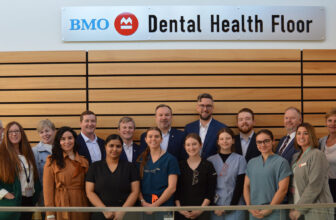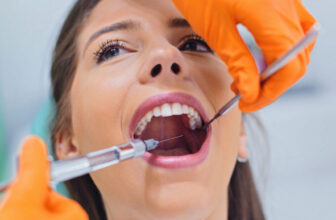
[adinserter block=”4″]
The impact of oral health on overall wellness is becoming better understood, with research showing associations between the health of one’s teeth and gums and systemic conditions like heart disease, diabetes, Alzheimer’s disease and more. Oral health is also influenced by conditions that are specific to women, including their menstrual cycle, pregnancy and menopause. In this blog, we’ll take a close look at how women’s health plays an important role in oral health.
Menstrual Cycle
Women sometimes find that their gums are more sensitive and may even bleed during their period or around the time of ovulation. The American Dental Association (ADA) explains that surges in estrogen and progesterone at these times can make gums more vulnerable to plaque and bacteria, sometimes causing inflammation and red, swollen gums. Extra care during brushing and flossing can help to minimize plaque buildup as much as possible. Some women also report canker sores or swollen salivary glands during that time of the month. These issues tend to go away on their own, but see your dentist if they do not or are causing any concern. The ADA offers some tips and over-the-counter options to help with canker sores.
Pregnancy
Pregnancy is marked by significant fluctuations in hormone levels. These changes can increase a woman’s risk of oral health conditions, including periodontitis, loose teeth, and erosion of tooth enamel caused by the vomiting or heartburn that sometimes come with pregnancy. Taking care of your teeth and gums is especially important during pregnancy, as studies have linked maternal oral health to conditions like preeclampsia as well as to a healthy birth weight. Both the Office on Women’s Health and the ADA stress the importance of maintaining routine visits to the dentist during pregnancy to help protect your teeth.
Menopause
Menopause is another time when women experience substantial hormonal changes. Many women experience dry mouth during menopause as a result of decreasing levels of estrogen. As the ADA explains, dry mouth increases your risk of cavities. If you are experiencing dry mouth, sucking on ice chips, drinking lots of water and using an over-the-counter dry mouth spray may help. The Office on Women’s Health notes that some women also experience weakened jaw bones during menopause, which may be caused by osteoporosis. Work closely with your dentist and general doctor to ensure you’re getting the right amount of vitamins and support to reduce your risk of tooth loss.
Hormonal changes can play an important role in changes in the mouth. Taking care of your teeth and gums can go a long way toward keeping your smile healthy as well as supporting your overall wellness. Along with brushing and flossing, be sure to keep up with regular visits to the dentist to catch minor issues before they become bigger problems.
[adinserter block=”4″]
Source link






